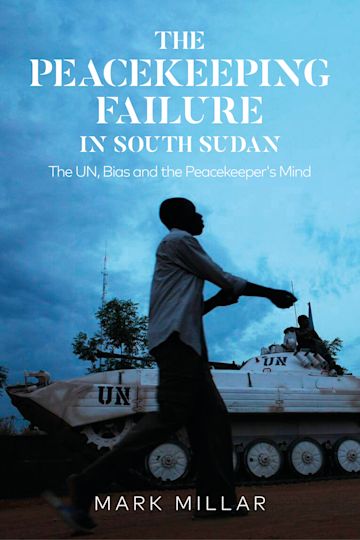This product is usually dispatched within 3 days
Free US delivery on orders $35 or over
You must sign in to add this item to your wishlist. Please sign in or create an account
In 2011, South Sudan was welcomed into the United Nations as the world's newest nation. Celebrations on the ground reflected palpable relief after more than 20 years of violent struggle. With unprecedented goodwill and optimism, the UN deployed 7,000 soldiers and another 2,000 police and civilian peacekeepers to the country to support its transition to independence.
However, the mission failed and within less than three years South Sudan was plunged into a catastrophic civil war. Using firsthand accounts from senior UN officials and referencing hitherto unseen UN documents, this book explores the role of the peacekeeping mission in that failure. It challenges the resignation with which many in academia and the media greeted the underperformance of the peacekeepers. It suggests that, even while under-resourced, they could have done much more to prevent bloodshed in the new country and protected civilians from the chaos of the first years of the conflict. The UN has thus far avoided a thorough and public examination of its actions in South Sudan. It has avoided accountability and instead rewarded failed decision-makers. This book is an attempt to re-assess the legacy of that mission and to detail how its many mistakes can and should be avoided in the future.
| Published | Mar 21 2024 |
|---|---|
| Format | Paperback |
| Edition | 1st |
| Extent | 224 |
| ISBN | 9781350273887 |
| Imprint | Zed Books |
| Dimensions | 9 x 6 inches |
| Publisher | Bloomsbury Publishing |
[An] honest and important book
International Affairs
This book offers a rare glimpse of the inside workings of the UN peacekeeping mission in South Sudan, but perhaps even more importantly, Millar as a practitioner-scholar provides the reader with sharp and useful reflections and recommendations. The book combines an easy flowing prose, nitty-gritty details from extended stays in the field and at United Nations Headquarters in New York and somber reflections on the (in)ability of UN peace operations to execute the tasks they are given when deployed into very challenging circumstances. Drawing on organizational studies and decision theory, Millar also makes a useful contribution to the academic literature on these topics. I would strongly recommend the book to students, scholars and anyone interested in getting an inside view of the organizational life of the UN, and a better understanding of how international bureaucracies work in practice and how they can be improved to serve those in need.
John Karlsrud, Research Professor, Norwegian Institute of International Affairs, Norway
Millar's thought-provoking study offers a pertinent critique of the UN's peacekeeping performance in South Sudan. He convincingly highlights how the personal values, psychological, and cognitive factors of peacekeeping leadership shape their preferred responses – sometimes with disastrous results. This book is essential reading for those trying to understand why peacekeeping may fail.
Ingvild Bode, Associate Professor, Centre for War Studies, University of Southern Denmark, Denmark
A rare and raw insider account of the repeated failures of the peacekeeping mission in South Sudan, told from the perspective of someone who both spent time at headquarters and in the field during the height of the country's civil war. Millar paints a stark picture of a UN mission plagued by a culture of risk aversion and conflict avoidance and one that didn't learn from past mistakes, making this an essential yet frustrating read.
Sam Mednick, former Associated Press South Sudan correspondent and freelance journalist
Mark Millar has written a clear-eyed and cogent insider account of the failures of the United Nations Mission in South Sudan. How did a billion-dollar mission staffed with intelligent, idealistic employees so calamitously fail the people of South Sudan? The Peacekeeping Failure provides a compelling account.
Joshua Craze, Fellow at the London School of Economics and Political Science, UK

This book is available on Bloomsbury Collections where your library has access.
Free US delivery on orders $35 or over
Your School account is not valid for the United States site. You have been logged out of your account.
You are on the United States site. Would you like to go to the United Kingdom site?
Error message.

